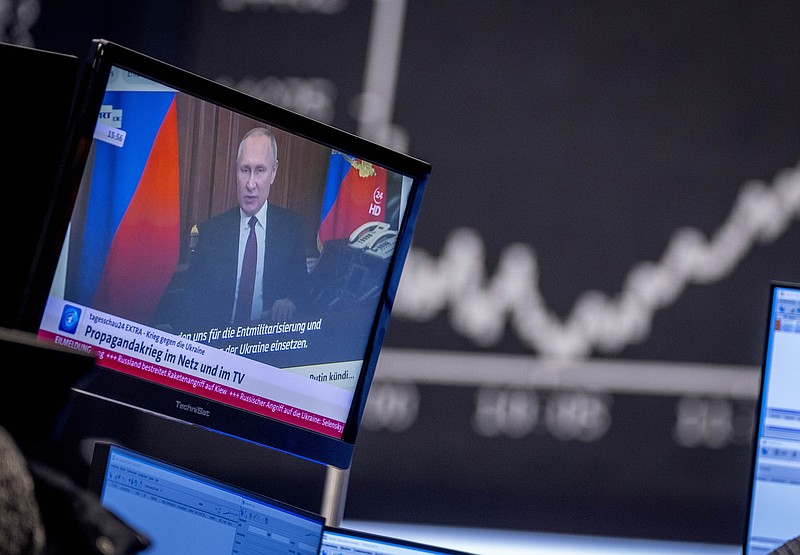Across the internet, there's been a rapid uptick in suspicious accounts spreading anti-Ukrainian content, according to a report from Cyabra, an Israeli tech company that works to detect disinformation.
Cyabra's analysts tracked thousands of Facebook and Twitter accounts that had recently posted about Ukraine, and they saw a sudden increase in anti-Ukrainian content in the days immediately before Russia began its invasion. On Valentine's Day, for instance, the number of anti-Ukrainian posts created by the sample of Twitter accounts jumped by 11,000% when compared with just days earlier. Analysts believe that a significant number of the accounts are inauthentic and controlled by groups linked to the Russian government.
"When you see an 11,000% increase, you know something is going on," said Cyabra CEO Dan Brahmy. "No one can know who is doing this behind the scenes. We can only guess."
But analysts at several different research organizations said they are seeing a sharp increase in online activity by groups affiliated with the Russian state. That's in keeping with Russia's strategy of using social media and state-run outlets to galvanize domestic support while seeking to destabilize the Western alliance.
The work has been underway for some time.
Researchers at the Atlantic Council's Digital Forensic Research Lab analyzed 3,000 articles by 10 state-owned Russian news outlets and noticed a big increase in unfounded claims that Ukraine was poised to strike separatist groups. Overall, Russian media claims of Ukrainian aggression surged by 50% in January, according to the research.
"This is the way they go to war; it's a central part of Russian doctrine," said Jim Ludes, a former U.S. defense analyst who now directs the Pell Center for International Relations and Public Policy at Salve Regina University. Ludes said Russian disinformation campaigns are intended to galvanize Russian support while confusing and dividing the country's opponents.
Russia tailors its propaganda message for specific audiences.
For Russians and pro-Russian separatists in Ukraine, the message is that Russia is trying to defend its people against Western-fueled aggression and persecution in Ukraine. Similar tactics have been used by other nations, including by Nazi Germany when it invaded Czechoslovakia under the guise of protecting ethnic Germans living there, Ludes noted.
"It's not good guys who use this tactic," Ludes said. "It's the language of conquest, not the language of democracy."
Russia is also using disinformation to confound its opponents. For instance, the Kremlin said it resumed fighting Saturday after pausing for possible talks with Ukraine. But journalists in various areas of Ukraine saw that the Russian offensive never stopped.
Meanwhile, the U.S. has information indicating Russia is publicizing false reports about widespread surrenders of Ukrainian troops and claims that Moscow plans to "threaten killing family members of Ukrainian soldiers if they do not surrender," according to State Department spokesman Ned Price.
RUSSIA SEEKS DIVISION
In the West, Russia seeks to sow division and reduce the chances of a unified international response. It does this in part through a stable of state-controlled media outlets such as Sputnik and RT, which publish in English, Spanish and several other languages.
"The invasion is off," read one headline in RT just days before Russian troops moved into eastern Ukraine.
As Russian military forces began their assault Thursday, the top news stories on RT's English-language website weren't about missiles, airborne troops or the deaths of civilians. Instead, the most prominent headlines included, "Firm admits selling potentially tainted rocket fuel to NASA" and "U.S. investigating complaints of self-braking Hondas."
Long denounced as Russia's propaganda megaphone by the Western nations where it broadcasts, the network has routinely echoed President Vladimir Putin's criticisms of NATO and the United States, and it championed his rationale for attacking Ukraine.
Poland on Thursday banned the network, following Germany's decision to do so last month. French lawmakers have asked for its license to be rescinded, and British Prime Minister Boris Johnson urged his nation's media regulator to monitor RT UK for "disinformation" and take action against it if necessary.
The European Union also signaled its concerns about RT on Wednesday when it included the network's editor-in-chief on a list of sanctions imposed on Russian officials. The EU called Margarita Simonyan "a central figure of the government propaganda."
The United States has been reluctant to ban RT's domestic offshoot, RT America, whose headquarters are located three blocks from the White House, for fear of a retaliatory response from Putin against Western news organizations in Russia.
RT has nevertheless attracted the attention of several presidential administrations. During Barack Obama's presidency, Secretary of State John Kerry called it a "propaganda bullhorn," and another State Department official denounced it as "a distortion machine." And in 2017, the Trump administration compelled RT to register as a "foreign agent," officially recognizing that it was working to advance Russia's interests.
RT America broadcasts some of the programming produced in Moscow but also produces its own news and business programs, documentaries and talk shows. Its offerings include a politics-discussion program hosted by Scottie Nell Hughes, who once served as a pro-Trump pundit on CNN and Fox News. A handful of American celebrities, including William Shatner and comedian Dennis Miller, also host shows for RT.
Neither Miller nor Shatner has said anything publicly about the Russian invasion; representatives for both men did not immediately respond to inquiries. RT America also did not respond to multiple inquiries.
Information for this article was contributed by David Klepper, Vladimir Isachenkov, Matthew Lee and Nathan Ellgren of The Associated Press; and by Paul Farhi, Drew Harwell and Elahe Izadi of The Washington Post.
